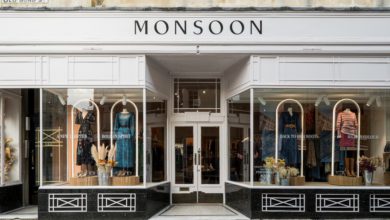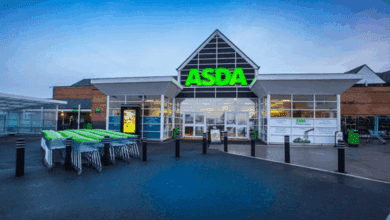How UK retailers can make the most of Chinese New Year

Register to get 1 free article
Reveal the article below by registering for our email newsletter.
Want unlimited access? View Plans
Already have an account? Sign in
Chinese New Year falls on the 5th of February this year and ushers in a week-long, national holiday in China. This major holiday, known as Golden Week, is a prime time for Chinese people to travel abroad, and the UK is one of their top destinations.
Why is the UK favoured by Chinese tourists? As well as the cultural as-seen-on TV aspects they are eager to witness, including the Royal Family, Harry Potter, Sherlock Holmes, and an unusual fascination with UK football teams, the weakening of the sterling and tax-free shopping is as big an incentive as a visit to Buckingham Palace for the millions of Chinese tourists.
Retailers cater to growing number of Chinese tourists
VisitBritain reports there were a record number of visits from China to the UK in the first quarter of 2018 – up 24 percent from the previous year – with those visitors spending a record £96 million and, on average, spending three times more than the standard visitor.
Indeed, even outside of Golden Week, in 2018, Chinese visitors remained the UK’s biggest group of tax-free spenders, accounting for 26% of total tax-free sales in London between January and August 2018. According to VisitBritain’s Market and Trade Profile on China, going shopping is the number one activity which most Chinese visits will feature, followed by dining in restaurants, visiting parks or gardens, museums or galleries, and castles or historic houses.
In particular, Chinese visitors are after luxury brands such as Burberry (its Britishness making it even more desirable), Louis Vuitton and Gucci. Many of these brands are already capitalising on the influx of Chinese shoppers during Golden Week, specifically gearing brand campaigns to court the business of these prolific purchasers.
Burberry have launched a Chinese New Year campaign with an award-winning photographer, focussing on the importance of family during the holiday’s celebrations; and in a second year running, French accessories brand Longchamp has created a fun selection of pig-themed accessories to coordinate with the upcoming Year of the Pig – one of 12 animals used to represent specific years in the Chinese zodiac. With Gartner L2 reporting that Chinese consumers are set to make 45% of the world’s luxury purchases by 2025, it is vital for retailers to crack China’s most important holiday.
Beyond targeted product and advertising campaigns, UK retailers have an opportunity to massively boost footfall during this influx of shoppers who have cash to splash. With the arrival of Golden Week shoppers to the UK, not only to luxury boutiques but also to department stores and high street retailers, it is particularly vital that retailers know how to make the most of the increase in in-store customers. Some department stores and high street retailers have already responded by engaging staff who speak Mandarin and Cantonese and ensuring customers are able to pay through Chinese digital wallets apps such as WeChat Pay and AliPay. However, one of the less apparent, but most effective ways for retailers to drive Chinese shoppers to bricks-and-mortar stores is by successfully managing their online presence.
How retailers can maximise online visibility
Online visibility goes further than building a slick website, and retailers who understand how to effectively manage location marketing, as well as their social media presence and customer reviews, are in the best position to maximise their online visibility and capture shoppers’ online attention and bring them in-store.
Unfortunately, many retailers are struggling to master these basics. In recent research by Uberall, it was revealed that 85% of the UK’s leading department stores’ Google My Business listings were inaccurate. In addition to making it harder for consumers to find a business, any inconsistency between the data held on various search engines and on proprietary websites negatively impacts overall search results, causing store listings to drop in search engine rankings. This is because search engines continually cross-reference directories to verify their results, so if information is inconsistent, the slightest variation, even in the business name or store hours, could bump them off the all-important first page of search results.
Many stores are thus ‘invisible’ online because they don’t show up in local search results and listings. In an era when Uberall found that 82% of smartphone shoppers conduct ‘near me’ searches and, according to Moz, 9 out of 10 shoppers only click on the first set of results, retailers can’t afford to be invisible online.
VisitBritain reports that 88% of Chinese travellers regard their smartphone as essential whilst on holiday, and with visiting Chinese shoppers consulting their phones when heading to the high street, stores that can find a way to optimise their online presence have an opportunity to turn their fortunes around by increasing footfall to their stores. With Chinese New Year visitors travelling around the UK – Edinburgh and Manchester being their top destinations outside of London, as well as Oxford’s Bicester Village where Chinese New Year is being recognised with a ‘Celebrating China pop-up boutique’ featuring the collections of up-and-coming Chinese fashion designers – it’s critical for all stores to have up-to-date online listings.
Furthermore, engaging customers online via social media and through reviews is vital to improving organic search engine optimisation (SEO), which raises search engine rankings naturally. Two key factors in SEO are the use of keywords and trustworthiness – social media and online reviews directly impact both of these elements, providing perpetually updated data and fresh content, allowing search engines to connect users to the most relevant information.
Responding quickly and individually on social media and to online reviews is a sure-fire way to improve SEO. Genuine customer engagement not only encourages loyalty and brand trustworthiness, both online and offline, it also helps improve organic SEO. In a recent Sprout Social survey, when brands respond to customers through social media and online, 65% became more loyal to the brand. This customer feedback is organic, free-of-charge and improves search-engine rankings and brand visibility.
Admittedly, the process of managing business listings, social media, and reviews manually for multiple stores – which can number from tens to hundreds, or even thousands of stores – is time consuming and burdensome. However, businesses can utilise location marketing technology to streamline this process of optimising the online visibility of their physical locations by managing their online presence from one platform that monitors business, social media, and review profiles and syncs updates across chosen sites all at once.
Chinese New Year presents retailers with a fantastic opportunity, and using location marketing solutions to tackle these challenges and achieve online visibility in the widest possible sphere is well worth the effort – especially during Golden Week, when Chinese visitors will be pounding the high street in search of their next purchase.
By Daniel Mathew, VP Uberall







